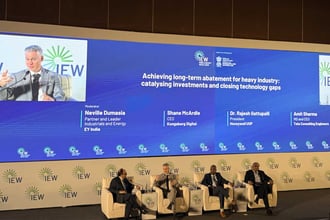March 11, 2025
AI Trends Rewiring the Energy Industry

One of the energy industry's biggest blind spots for 2025 isn't technology - it's people. While headlines focus on cybersecurity, renewable integration, and carbon capture, the fundamental shift many players aren't prepared for in an AI-driven world is workforce readiness and how best to empower their workforce with AI.
There is also a critical gap between advanced technologies being deployed and the skills needed to leverage them effectively. This gap creates a dangerous disconnect. New systems require new competencies and new ways of thinking yet training and adoption programs lag behind implementation schedules.

The Digital Skills Imperative
Traditional energy companies face a dual transformation challenge. They must simultaneously integrate renewables and digitalise operations. Both require entirely new workforce capabilities and new investments. And both require convincing and educating stakeholders.
Training programs need reimagining. Emergency preparedness takes on new dimensions when AI systems help users manage critical infrastructure. Predictive maintenance requires different skills than traditional scheduled maintenance. Supply chain management is becoming increasingly data driven. Market analysis demands algorithmic thinking.
Companies that treat this as merely a technical transition miss the human element. Success depends on workers who understand both energy fundamentals and digital systems and approach digital as foundational to their business and how it will operate in the future.

AI as Grid Conductor
Among the most transformative applications of AI in energy is the fundamental reshaping of grid management. AI now serves as a smart grid conductor, orchestrating energy flows in real-time based on massive data sets. This goes beyond simple automation. The technology predicts and adjusts to fluctuating conditions, balances supply and demand, and integrates variable renewable sources seamlessly.
Carbon Capture’s Reality Check
Carbon capture and handling technologies still face substantial barriers despite their growing importance. Cost remains the primary obstacle, with safety and public perception following closely behind.
Digital technology has a key role to play in the energy transition, opening game-changing improvements in carbon transparency, reducing emissions and decarbonising operations.

Europe’s Complex Competitive Landscape
The European Union creates the most fascinating competitive dynamics for energy companies due to its regulatory diversity. The region combines highly progressive renewable mandates with traditional fossil-dependent markets, all within a single interconnected system.
Member states pursue dramatically different energy policies resulting in a complex operating environment that requires sophisticated market strategies.
The EU-wide regulatory framework overlays these national differences, setting ambitious targets that force adaptation across the bloc. Companies must navigate both levels of regulation simultaneously.
Europe’s well-developed cross-border electricity grid with energy trading across regulatory boundaries creates both arbitrage opportunities and operational challenges.
The region’s position as a clean energy innovation hub provides early access to emerging technologies. Companies with European operations can gain valuable experience with solutions that later deploy globally.

Investment Gaps and Climate Goals
Despite growing attention to energy transition, the industry faces a substantial investment gap relative to Paris climate accord commitments. Current capital flows fall well short of what’s needed to meet international climate targets.
This underspending creates both risks and opportunities. Companies that move decisively to fill gaps may secure advantageous positions in emerging markets.
The Transparency Mandate
Consumer demand for environmental transparency continues accelerating. When asked if they care about environmentally and ethically sustainable products, consumers overwhelmingly answer yes.
This preference drives increased reporting requirements and accountability measures. More detailed disclosure seems likely to become standard practice.
The key challenge will be demonstrating efficiency improvements in ways that resonate with end customers. Technical metrics must translate into consumer-friendly communication that enables informed choices.
Companies need to develop communication strategies that allow end users to effectively relay sustainability credentials to their own customers. This creates cascading transparency demands throughout value chains.
Preparing for 2025 and Beyond
The energy industry stands at a pivotal moment. Success in 2025 and beyond requires simultaneously addressing workforce transformation, technological implementation, regulatory navigation, and consumer expectations.
Companies that understand these interconnected challenges will emerge as leaders. Those that focus exclusively on technology while neglecting human factors risk creating sophisticated systems with insufficient talent to operate them effectively.
At Kongsberg Digital we see the most promising approaches integrating skills development and user training with technology deployment from the very beginning. This synchronised evolution creates capabilities that match ambitions and is just one of the underlying principles behind our Digital Performance Model (DPM) approach. A DPM helps organisations reimagine the “work to be done” from cross-functional user perspectives and cuts through siloed data and workflows to enable higher-quality and faster decision-making.
With focus on user experience and ease of adoption, ensuring improvements align with productivity enhancements and job satisfaction, enabling smarter, faster decision-making – we are always mindful that a human will remain at the core of the technology. We collaborate closely with organisations by engaging with key asset teams and business process owners to build sponsorship. This cultivates respected champions who act as catalysts for successful implementation.
The energy transition demands both technical and human transformation. By addressing both dimensions, companies can navigate the complex landscape of 2025 and beyond with confidence.
Let us know your thoughts. When you look at the energy landscape in 2025, what fundamental shifts do you see happening?
Author

Jeff Dietrich
Senior Industry Content Writer, Kongsberg Digital



